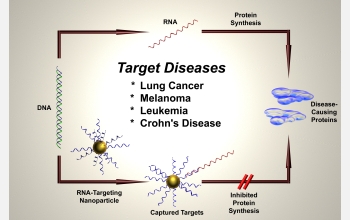News Release 06-086
Gold Nanoparticles Could Improve Antisense Cancer Drugs

A gold nanoparticle coated with antisense DNA can disrupt protein production quite effectively.
May 18, 2006
This material is available primarily for archival purposes. Telephone numbers or other contact information may be out of date; please see current contact information at media contacts.
By attaching strands of "antisense" DNA to nanometer-scale particles made of gold, scientists at Northwestern University have significantly enhanced the strands' ability to suppress the production of dangerous proteins--such as those that cause cancer.
The Northwestern team, led by Chad A. Mirkin, director of the university's Center for Cancer Nanotechnology Excellence, was supported in part by the National Science Foundation. The center itself is funded by the national Cancer Institute. The team's findings are detailed in the May 19 issue of the journal Science.
Antisense DNA, a kind of molecular mirror image of ordinary DNA, can be tailored to disrupt the production of specific protein molecules in the cell. For this reason, researchers have long believed that antisense DNA could be more effective than conventional drugs at fighting cancer and other diseases with a genetic basis. But development has been hampered by the tendency of antisense DNA to break down in the body.
Now, however, the Northwestern group has shown that attaching antisense DNA strands to the surface of gold nanoparticles not only makes the strands more stable, but more effective in its protein-suppression role.
In addition to Mirkin, other authors on the Science paper are Nathaniel L. Rosi (co-first author), David A. Giljohann (co-first author), C. Shad Thaxton, Abigail K. R. Lytton-Jean and Min Su Han, all from Northwestern University.
For more information, see the Northwestern University news release.
-NSF-
Media Contacts
M. Mitchell Waldrop, NSF, (703) 292-7752, email: mwaldrop@nsf.gov
Megan Fellman, Northwestern University, (847) 491-3115, email: fellman@northwestern.edu
The U.S. National Science Foundation propels the nation forward by advancing fundamental research in all fields of science and engineering. NSF supports research and people by providing facilities, instruments and funding to support their ingenuity and sustain the U.S. as a global leader in research and innovation. With a fiscal year 2023 budget of $9.5 billion, NSF funds reach all 50 states through grants to nearly 2,000 colleges, universities and institutions. Each year, NSF receives more than 40,000 competitive proposals and makes about 11,000 new awards. Those awards include support for cooperative research with industry, Arctic and Antarctic research and operations, and U.S. participation in international scientific efforts.
Connect with us online
NSF website: nsf.gov
NSF News: nsf.gov/news
For News Media: nsf.gov/news/newsroom
Statistics: nsf.gov/statistics/
Awards database: nsf.gov/awardsearch/
Follow us on social
Twitter: twitter.com/NSF
Facebook: facebook.com/US.NSF
Instagram: instagram.com/nsfgov
